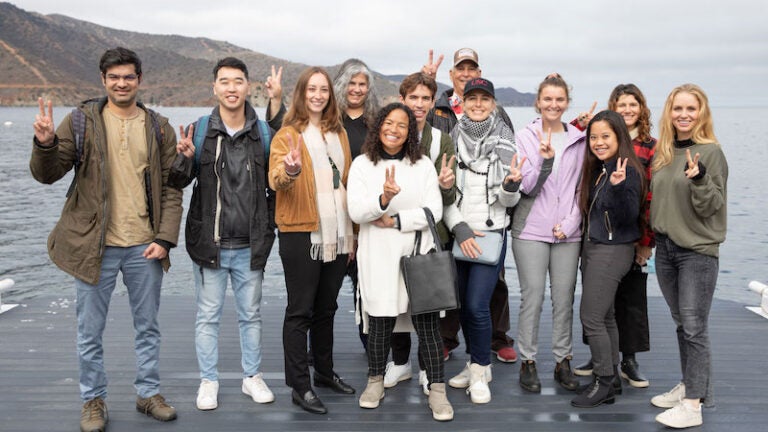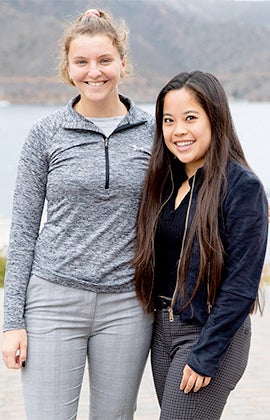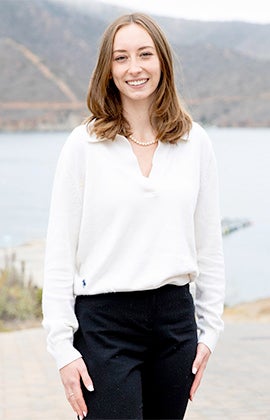
Finalists for the 2021 Wrigley Sustainability Prize pitch green business solutions
Highlights:
- Chosen from among dozens of entrants, seven finalists duke it out for top honors in the annual Wrigley Sustainability Prize.
- Two finalists from USC Dornsife are tackling plastic, a major source of pollution.
- One team aims to save the nation’s food industry $11 billion with reusable to-go containers.
- Another team uses chemistry to break down unrecyclable polyvinyl chloride so it can be recycled.
Seven teams are hard at work buttoning up their pitches ahead of the 2021 Wrigley Sustainability Prize final showcase. For the fifth consecutive year, seed money from the Wrigley Institute of Environmental Studies will help USC students realize their sustainability-focused entrepreneurial visions.
Out of the dozens of applicants who submitted their pitches, a handful were selected to attend a weekend-long executive workshop on Santa Catalina Island off the coast of Los Angeles in late October. There, they received hands-on training from USC Marshall School of Business instructors in preparation for the final round of competition.
On Friday, Nov. 19, the finalists will attend a public showcase where they will pitch to a panel of environmental experts and startup investors, and three of the teams will ultimately go home with cash prizes: $7,000 for first place, $5,000 for second place and $3,000 for third place.
Meet the finalists from the USC Dornsife College of Letters, Arts and Sciences:
PV-C
Team Members:
Nancy Bush | Inorganic Chemistry
Caitlin Dinh ’22 | Chemistry
We’re in the elevator. You know the drill. What’s the pitch?

Nancy Bush, left, and Caitlin Dinh.
PVC plastics are the third most produced in the world, yet cannot be recycled due to the chlorine atom in their polymer structure. When the plastics are thrown away, the chlorine breaks down into corrosive acid and dioxins in landfills.
We plan to catalytically cleave the chlorine from the PVC, turning it into sodium chloride and polyethylene, one of the easiest plastics to recycle mechanically.
What makes you passionate about the industry you are competing in?
As chemists, it is hard for us to see so many pollutants that were made by chemists [leaching into] our water systems, landfills and food. It is now our job to find solutions that can better the lives of people and the planet.
Five years from now, how do you hope your business will have impacted society?
PV-C could reduce PVC in landfills, reduce the need for virgin polyethylene plastic production and reclaim chlorine in the form of salt, which is easily reused for use in chlorine manufacturing, thus reducing the need for chlorine mining.
What advice would you give to fellow students hoping to create a sustainability-focused company?
Sustainability means so much more than just long-term environmental viability. It means keeping the earth alive and thriving for the good of the people on it.
Many companies use the word sustainability but don’t understand the full scope of their actions. What may seem like a helpful solution could actually harm others in the process. Do an entire analysis of your supply chain: Where you are sourcing materials? Who you are trusting to help run your business? The more thoughtful you are, the better the impact you will make.
If you win, how will you invest your prize money?
The prize money will go to supporting the scientific advancements needed to push our chemistry to commercial viability. With more experimental testing, we hope to find cheaper metals to work with, such as nickel, in order to make our process more cost-effective.
Breeze Box
Team Members:
Nancy Nicole Summerfield | Environmental Studies
Gaia Palliere | Advertising and Marketing Communications at Pace University
We’re in the elevator. You know the drill. What’s the pitch?

Nancy Summerfield.
Breeze Box represents the future of sustainability, where cost-saving alternatives are also environmentally friendly. Currently, single-use containers are guaranteed to send money straight into the landfill, costing American food vendors nearly $11 billion annually and providing a subpar dining experience to hundreds of millions of take-out consumers.
Not only do our high-quality boxes offer an elevated dining experience, but our in-house inventory tracking software sets us apart as innovators in the sustainability industry. We’re already in operation at an off-campus house and have plans to expand to college campus eateries across the country, beginning with USC.
What was your initial inspiration for your business?
While working in a restaurant throughout the pandemic, I [Nancy] quickly noticed the absurd amount of single-use containers wasted daily by restaurant staff and guests alike. Much of this waste can be attributed to the flimsy nature of these to-go boxes. They were just a money sink for restaurants that had already been struggling throughout the beginning of the pandemic.
Not only that, but although the containers are marketed as compostable and recyclable, kitchen staff rarely separated them from other trash. My co-founder and I saw an opportunity to revolutionize the food industry. We have since grown in our knowledge and understanding of this business, coming to form our two primary products: the Breeze Box reusable to-go container and our in-house inventory tracking software, Aspen.
What makes you passionate about the industry you are competing in?
One of the most significant environmental issues we face today is the rate at which the global population consumes and disposes of single-use materials. The vast majority of these materials cannot decompose entirely, and over the past decades, they have worked their way into every corner of every ecosystem on Earth. The team at Breeze Box believes that anyone can have an impact, and we strive to provide sustainable solutions that benefit everyone involved.
Five years from now, how do you hope your business will have impacted society?
Five years from now, I envision Breeze Box as the new normal in college campuses and expanding to other centralized food vendors such as hospitals and shopping center cafeterias, with single-use containers transforming into a societal taboo. I picture different types of vendors utilizing our inventory tracking software, Aspen, to facilitate the reusable alternatives to commonly single-use products.
Not only that, but I imagine a vast community of Breeze Buddies who share mutual regard for their impact on the environment, employing community forums and feeds containing posts and information regarding sustainability and the environment.
If you win, how will you invest your prize money to grow your company?
Most of the money would further development of our inventory tracking software, Aspen, and create our user interface for vendors to utilize and streamline box tracking. A portion of the money will be saved as a reserve of capital for future orders.